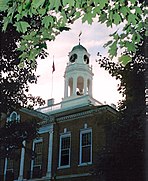| This article needs additional citations for verification. Please help improve this article by adding citations to reliable sources. Unsourced material may be challenged and removed. Find sources: "Harkness table" – news · newspapers · books · scholar · JSTOR (March 2009) (Learn how and when to remove this message) |


The Harkness table, Harkness method, or Harkness discussion is a teaching and learning method involving students seated in a large, oval configuration to discuss ideas in an encouraging, open-minded environment with only occasional or minimal teacher intervention.
Overview
The Harkness method is in use at many American boarding schools and colleges and encourages discussion in classes. The style is related to the Socratic method. Developed at Phillips Exeter Academy, the method's name comes from the oil magnate and philanthropist Edward Harkness, who presented the school with a monetary gift in 1930. It has been adopted in numerous schools, such as The Dunham School, St. Mark's School of Texas, Milton Academy, The College Preparatory School, The Masters School, and Seoul Foreign School where small class-size makes it effective. However, Harkness remains impractical for schools with larger class sizes. Harkness described its use as follows:
- What I have in mind is where could sit around a table with a teacher who would talk with them and instruct them by a sort of tutorial or conference method, where would feel encouraged to speak up. This would be a real revolution in methods.
Harkness practices can vary, most notably between humanities subjects such as English and history and technical subjects such as math and physics.
References
- "The Amazing Harkness Philosophy". Phillips Exeter Academy. Retrieved 2011-06-25.
- "Harkness". The Dunham School. Retrieved 2023-06-09.
- "Seoul Foreign School". Seoul Foreign School.
- Christophe G. Courchesne, "'A Suggestion of a Fundamental Nature': Imagining a Legal Education of Solely Electives Taught as Discussions", Rutgers Law Record 29, no. 21 (2005): 26.
- "How You'll Learn". Phillips Exeter Academy. Archived from the original on 2020-09-01. Retrieved 2018-06-30.
External links
- 'Edward S. Harkness, 1874-1940', Richard F. Niebling, Phillips Exeter Academy (PDF)
| Phillips Exeter Academy | ||
|---|---|---|
| Campus |  | |
| Student organizations | ||
| Alumni | List of Phillips Exeter Academy alumni | |
| Faculty |
| |
| Athletics | ||
| Affiliations | ||
| Misc. | ||